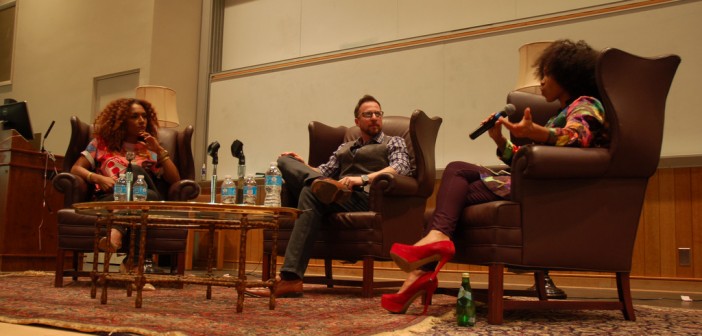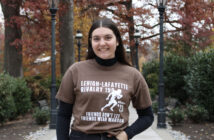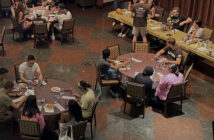“‘Identity Politics,’ wrestling with your identity and self-actualization as a study: The work that is being done here is vital. Its local action on national topics, all paired with national implications.”
These are the words of James Peterson, director of Africana Studies and associate professor of English at Lehigh. Peterson delivered opening remarks at the recent LGBT History Month event entitled “TRANSlating Identities.”
The event, held Oct. 23 in Packard 101, featured speakers Janet Mock and Ryan Sallans, two well-known transgender individuals, advocates and activists. Mock is a New York Times bestselling author and cultural commentator, while Sallans is a prominent LGBTQIA speaker and editor in chief for The Outrider Review.
“TRANSlating Identities” was the marquee event to close out LGBT History Month at Lehigh and was described as an exploration of identity, visibility and self-actualization considering gender, race and sexuality. In a panel format, participants asked questions focused on such themes, and the discussion was moderated by Monica Miller, assistant professor of religion and Africana studies.
“One of our objectives was to highlight transgender identity, something that really hasn’t been done before here at Lehigh,” said Eryne Boyle, ’15, a student program coordinator for the Pride Center for Sexual Orientation and Gender Diversity.
Turnout for the dialogue was considerable, filling the majority of Packard auditorium. Trish Boyles, director of the Pride Center, said the support and enthusiasm of the event shows the growth in the LGBTQIA community at Lehigh. Numerous Lehigh departments also co-sponsored “TRANSlating Identities” with the Pride Center.
Darius Williams, assistant professor of theatre, kicked off the commentary portion of the event with a deeply emotional performance. The monologue — part song, part spoken word — was an excerpt of a book Williams contributed to entitled “Mighty Real: An Anthology of African American Same Gender Loving Writing.” With its strong commentary and explicit directness, his soliloquy drew much applause.
Subsequently, Miller began the discussion of transgender issues with the night’s featured speakers. One focal point of the night was the semantics of language with regard to describing identities in general.
“The embodiments of self-actualization are always ahead of the language we describe them with,” Miller said. “Language is always so far behind and can never incorporate the existential identities of everyone as they self-actualize.”
Mock also received significant praise over her comments regarding transgender ally behavior. She described that allyship is not a bumper sticker to show liberalism or progressive policy, but rather an opportunity to be informed.
“Allyship is a constant evolution of education and action,” Mock said. “It’s not the sole transperson’s job on campus to inform others of what these terms and issues mean.”
This statement from Mock truly resonated with Michael Mullin, assistant director of Residence Life and the marketing and outreach coordinator for the Pride Center
“It was my favorite moment of the night (…) a lot of people on campus are not ready to put in the work to be an ally,” he said.
Many students enjoyed the event and the opportunity it provided for dialogue. Luis Castaneda, ’16, said he had never been in the presence of a “fiercer woman” and that the event was a balanced mixed of humor and empowerment.
Additionally, Miller led a discussion with the panelists about how intersectionality plays an integral role within their lives.
Sallans, who is a transgender female transitioned to male, discussed how he navigates the issue of being perceived as a visibly white, cisgender man in society.
“I try to remain accountable to the community and make sure my rights aren’t infringed upon,” Sallans said.
Boyles considered the event a step forward in terms of the bigger picture of the growth of the LGBTQIA community on campus.
“(This year) it seems like a lot more collaboration with other programs and departments,” she said. “So we are not so siloed and we can come together to learn about these topics.”






Comment policy
Comments posted to The Brown and White website are reviewed by a moderator before being approved. Incendiary speech or harassing language, including comments targeted at individuals, may be deemed unacceptable and not published. Spam and other soliciting will also be declined.
The Brown and White also reserves the right to not publish entirely anonymous comments.